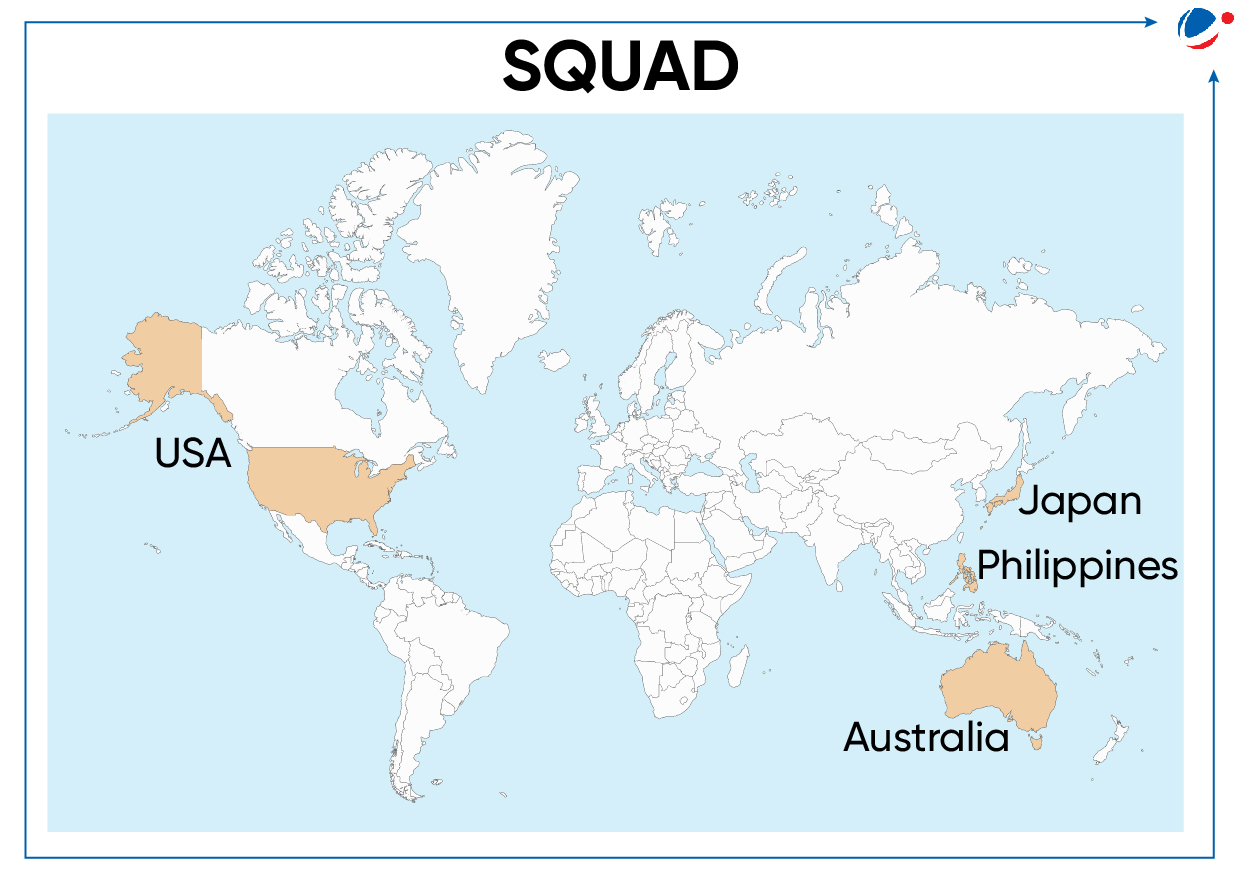Why in the News?
Chinese aggression in the Indo-Pacific has prompted the emergence of 'Squad', a minilateral grouping between the US, Japan, Australia and the Philippines.
More on the News

- Squad is seen as an addition to the series of security minilateral groupings in the Indo-Pacific such as the QUAD, AUKUS, US-Philippines-Japan trilateral and the US-Japan-South Korea trilateral etc.
- Its formation has highlighted the growing preference for minilateralism as the means of cooperation in the global world order.
What are Minilaterals?
Minilaterals are informal and targeted grouping with fewer states (usually 3 or 4) which intends to address specific threat, contingency or security issue sharing the same interest for resolving it within a finite period of time.
Reasons behind rise of Minilaterals
- Failure of the Multilateral Institutions:
- Existing multilateral institutions are facing difficulties to address new and emerging global challenges such as climate change, cyber security etc.
- E.g. ASEAN members failed to condemn Chinese action in South China Sea.
- Heightening Great-Power Rivalry impeding consensus E.g. Dysfunctional WTO's dispute settlement system, demand of reforms in the UN security council etc.
- Changing 'Balance of Power' and emergence of more aggressive and assertive China is leading to emergence of groupings such as QUAD, AUKUS, etc.
- Fallout of COVID-19 pandemic which revealed vulnerabilities of multilateral institutions. E.g. WHO handling of the Pandemic.
- Tyranny of Majority: Developed countries view the high bargaining power of the developing countries as tyranny of the majority. E.g. Developing countries like USA disagree with demand of Common but differentiated responsibilities (CBDR) principle by developing countries in trade and climate actions.
- Existing multilateral institutions are facing difficulties to address new and emerging global challenges such as climate change, cyber security etc.
- Advantages of Minilateralism
- Pragmatic alternative to cumbersome multilateralism as it allows increased flexibility and agility in decision making, striking convergences.
- Issue based cooperation allows like-minded countries to come together E.g. Supply-Chain Resilience initiative between Australia, India, and Japan etc.
- De-globalization and rise in protectionist tendencies makes it difficult to cooperate on multilateral platforms: E.g. US-China Trade War.
Reasons for Rise of Minilaterals in Indo-Pacific
|
Benefits of Minilaterals for India
- Maintaining strategic autonomy, enhance its policy of multi-alignment and ensure regional security.
- E.g. QUAD partnership between Australia, India, Japan, and the United States is committed to supporting an open, stable and prosperous Indo-Pacific that is inclusive and resilient.
- Emerge as a voice of global south by reconciling Western interests with the developmental agenda of the Global South.
- E.g., India-Brazil-South Africa (IBSA) Trilateral for reform in global institutions and South-South Cooperation
- Co-opting partners with similar interests in the Indo-Pacific framework can help in addressing specific issues.
- E.g., Australia, France, and India trilateral focuses on regional security; India-Iran-Armenia Trilateral- to boost International North-South Transport Corridor (INSTC) etc.
- Solve transnational as well as specific challenges in the areas of water, energy, food security etc.
- E.g. India-France-UAE trilateral cooperates on defence and energy.
- Allows India to be part of diverse Networks.
- E.g. part of U.S. alliances (QUAD) and the Middle East (I2U2).
- Restructuring the China-centered Asian integration by encouraging the shift of industrial supply chains out of China and building new coalitions.
- E.g. "Chip 4" semiconductor alliance (Japan, South Korea, Taiwan, and the United States)
- Other benefits:
- Maximize return on the geopolitical rivalry between the United States and China by partnering with different countries on different issues.
- Cement India's growing centrality in the emerging Indo-Pacific strategic architecture by an increased presence in smaller regional coalitions.
Challenges with Minilaterals
- Legitimacy and inclusiveness: Lack of inclusiveness can undermine interests of countries in Global South and impact their legitimacy.
- E.g. India-France-Australia Trilateral excludes various members of Indo-Pacific region.
- Limited resource and capabilities: Smaller groups lack sufficient collective resources to address complex global challenges like Climate Change.
- Tensions and divisions among countries: Due to potential for growth of exclusionary bloc politics, particularly in areas of strategic cooperation.
- China characterizes Quad as an 'Asian NATO'.
- Accountability and Transparency: Less formal structure and processes in minilaterals raise concerns of inadequate democratic oversight.
- Promote soft law mechanisms, i.e. voluntary and non-binding targets thereby leading to reduced accountability in global governance.
- E.g. SCRI (Australia, India, and Japan) countries have differences in their trade and economic outlooks.
- Informal Nature and lack of proper structures required for focused debates may lead to less effectiveness in shaping of state policies, interests, and behaviour for rules-based framework in the global order.
- Moreover, they may have a detrimental effect on countries that are not part of negotiations.
- E.g. WTO is an consensus based organisation and has proper structural mechanisms
- Diminished sanctity of multilateral frameworks by disrupting process of international interdependence and globalisation.
- This may lead to fragmentation of the global governance mechanisms. E.g. Ambiguity of QUAD's strategic interests to curtail Chinese influence.
Conclusion
As India should embrace the concept of Minilateralism along with Multilateralism in line with philosophy of Sarvajan Hitaya Sarvajan Sukhaya (Everyone's benefit, everyone's happiness). Moreover, India should keep pushing for reforms at the multilateral level to safeguard a universal rules-based framework while utilising the minilateral route in the short term.






